 Where, in Pennsylvania, the state GOP admitted that they are not aware of so much as a single instance in which an ordinary citizen has been charged with, let alone convicted of in-person voter impersonation --- the only form of voter fraud that can be prevented by disenfranchising polling place Photo ID restriction laws --- there have been a growing number of claims that political elites have used a false residence to vote, often to insure their own elections in a district where they do not reside.
Where, in Pennsylvania, the state GOP admitted that they are not aware of so much as a single instance in which an ordinary citizen has been charged with, let alone convicted of in-person voter impersonation --- the only form of voter fraud that can be prevented by disenfranchising polling place Photo ID restriction laws --- there have been a growing number of claims that political elites have used a false residence to vote, often to insure their own elections in a district where they do not reside.
On October 2, a Los Angeles Superior Court Judge ordered that "Los Angeles City Councilman Richard Alarcon [D] and his wife will face trial on 23 felony counts of perjury and voter fraud" when the couple allegedly used a false address to both vote and qualify for elective office within LA's 7th district, according to Los Angeles Times. The Alarcons claim they were simply using a second home outside the district while their other home was being renovated.
The issue of false residency voter fraud is neither novel nor limited to Democrats like Alarcon. Indeed, as Brad Friedman has tirelessly documented, the issue of false residency voter fraud amongst high-profile Republicans --- including the GOP's 2012 nominee for President of the United States --- has approached epidemic proportions.
Class, as well as party, may explain the disparity between the ability of the elites to commit false residency voter fraud with near impunity as compared to the harsh impact of Photo ID laws that address a phantom menace as applied to the most vulnerable segments of our society.
Here are just a few recent cases of false residency voter fraud by some faces you will be very familiar with. Only one of them, to date, has faced any sort of actual accountability for their election crimes...
False residence and high level Republicans
• MITT ROMNEY: Last Summer, long-shot GOP candidate Fred Karger filed a complaint with Massachusetts officials charging that the now presumptive GOP nominee for President of the United was illegally registered to vote in his son's unfinished basement in Belmont, MA, despite having moved out of the state several years earlier. The release of Romney's 2010 federal tax returns did little to dispel the concern. Romney failed to include his state returns in his release (or those from 2009) which would likely show, as Karger detailed, Romney was not a resident of Massachusetts at the time he voted for Scott Brown in the January 2010 U.S. Senate special election to fill the seat of the late Ted Kennedy. Romney, who had houses in CA and NH, did not, in fact, own a house in MA until July of 2010 (in anticipation of another Presidential run), despite the fact that state law defines residency as "where a person dwells and which is the center of his domestic, social, and civil life." Residents in Belmont, MA, told Karger that neither he nor his wife had been seen in the town since selling their mansion and moving out of state years earlier.
• INDIANA SEC. OF STATE CHARLIE WHITE: In February, White was tossed out of office after being declared guilty of three voter fraud felonies, having been found by a jury to have registered and voted from a residence where he did not actually live. (The same thing that Romney appears to have done, as noted above.) Although White was convicted on a total of six felonies, he did not have to serve even one day in jail. Instead he received one year of home detention. Prior to that, in a separate civil case, White was ordered immediately removed from office by a circuit court judge who found that his fraudulent registration made him ineligible to be on the ballot when he was elected in 2010 in the first place. Ironically enough, Indiana was the very first state in the nation, in 2008, to institute polling place Photo ID restrictions, despite being unable to cite a single instance of in-person voter fraud in state history. Those restrictions, however, failed to keep White himself, the state's top election official, from committing voter fraud.
• SEN. RICHARD LUGAR: Last February, the long-serving Senator from Indiana was accused of doing exactly what his state's Sec. of State Charlie White was tossed out of office for --- not living at the address where he was registered to vote. In this case, the allegations came from Tea Party supporters of Richard Mourdock who defeated the popular Lugar to become this year's U.S. Senate nominee. They charged that Lugar had been registered at a house where he had not lived since 1977. As in White's case, Indiana's First-in-the-Nation polling place Photo ID law failed deter any fraudulent voting by the erstwhile Senator.
• REP. TODD AKIN: Speaking of U.S. Senate candidates, the one nominated earlier this week by the Missouri Republican Party to face Claire McCaskill this November has, as reported by the St. Louis Post-Dispatch last year, been voting for years from a property outside of his own Congressional district where he does not live. The charges echoes those against Romney, Lugar and White. Akin's house, as the paper found at the time, was vacant and long-scheduled for suburban re-development. Still, the Congressman has continued to use it as his voting address for some seven elections, ever since the time that he and his family moved to their new house in a different town some 18 miles away.
• JON HUNTSMAN: In March of 2011, the then GOP Presidential hopeful was also identified as possibly having committed voter fraud. In his case, the former Governor remained registered to vote at the Executive Mansion in Utah well over a year after he had become the U.S. ambassador to China. As the Salt Lake Tribune noted at the time: "Huntsman voted by absentee ballot for last year’s general election using the state-owned mansion on South Temple as his Utah residence — months after Gov. Gary Herbert settled into the historic building and Huntsman purchased a home in Washington, D.C."
•ANN COULTER: Among many other recent cases of high-profile GOP voter fraud taking place prior to the past year, please remember (since the media didn't much tell you about them in the first place): GOP superstar ANN COULTER'S multiple cases of demonstrated voter fraud (in both FL and CT). Coulter evaded prosecution in CT only after the state's Election Commission ignored key evidence revealing that she resided in NY but used her parent's house to vote in CT.
Hypocrisy and the two-tiered system of justice
In reviewing the transgressions of Supreme Court Justice Clarence Thomas, The BRAD BLOG pointed to Law Professor Paul Campos' observation that it "is very unlikely [that Thomas would] be prosecuted or otherwise sanctioned for the simple reason that, in the United States in 2011, we have a two-tiered system of laws" where, for the vast majority of citizens, "an unusually harsh criminal code" has given rise to "by far the biggest prison population in the world."
Nonetheless, he added, "our political and financial elites operate with something approaching complete impunity."
The two-tiered system of laws suggests that class as well as party helps to explain the inconsistency between the application of disenfranchising Photo ID laws against the phantom menace of in-person voter fraud and near impunity with respect false residency voter fraud --- a form of voter fraud available to wealthy elites who can afford to purchase multiple homes.
As the PA Supreme Court recognized in its recent Photo ID decision, Photo ID laws most harshly impact "the most vulnerable segments of our society (the elderly, disabled...and the financially disadvantaged)."
Ernest A. Canning has been an active member of the California state bar since 1977. Mr. Canning has received both undergraduate and graduate degrees in political science as well as a juris doctor. He is also a Vietnam vet (4th Infantry, Central Highlands 1968). Follow him on Twitter: @Cann4ing.


 Court Blocks Hegseth Censure of Sen. Mark Kelly
Court Blocks Hegseth Censure of Sen. Mark Kelly Harpy Tantrums, Legal Losses, Election Fails, Retreating ICE and Other Hopeful Signs: 'BradCast' 2/12/26
Harpy Tantrums, Legal Losses, Election Fails, Retreating ICE and Other Hopeful Signs: 'BradCast' 2/12/26 'Green News Report' 2/12/26
'Green News Report' 2/12/26
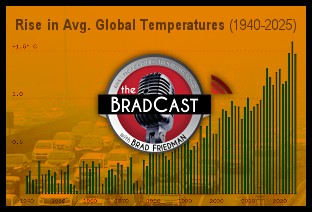 'Let Kids with Asthma Suffer': Trump to Reverse EPA's Landmark 'Endangerment Finding': 'BradCast' 2/11/26
'Let Kids with Asthma Suffer': Trump to Reverse EPA's Landmark 'Endangerment Finding': 'BradCast' 2/11/26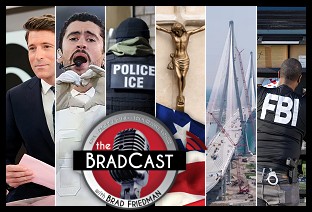 Trump's Presidency Now About Little More Than Racism, Corruption, Culture War Nonsense: 'BradCast' 2/10/26
Trump's Presidency Now About Little More Than Racism, Corruption, Culture War Nonsense: 'BradCast' 2/10/26 'Green News Report' 2/10/26
'Green News Report' 2/10/26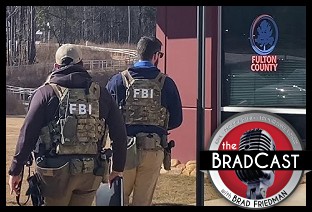 About Trump's FBI Raid of the Fulton County, GA Elections Warehouse: 'BradCast' 2/9/26
About Trump's FBI Raid of the Fulton County, GA Elections Warehouse: 'BradCast' 2/9/26 Sunday 'Dead in Darkness' Toons
Sunday 'Dead in Darkness' Toons 'New START' Treaty Allowed to End Amid New World Disorder: 'BradCast' 2/5/26
'New START' Treaty Allowed to End Amid New World Disorder: 'BradCast' 2/5/26 'Green News Report' 2/5/26
'Green News Report' 2/5/26 Trump Turns 'War on Terror' Tools Against Domestic Political Foes: 'BradCast' 2/4/26
Trump Turns 'War on Terror' Tools Against Domestic Political Foes: 'BradCast' 2/4/26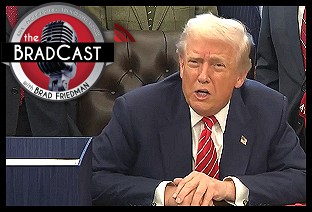 Losing Legally and Politically, Trump Threatens to 'Nationalize' Elections: 'BradCast' 2/3/26
Losing Legally and Politically, Trump Threatens to 'Nationalize' Elections: 'BradCast' 2/3/26 'Green News Report' 2/3/26
'Green News Report' 2/3/26 Bad and Good Bunnies, and an Electoral Shock in Deep 'Red' TX: 'BradCast' 2/2/26
Bad and Good Bunnies, and an Electoral Shock in Deep 'Red' TX: 'BradCast' 2/2/26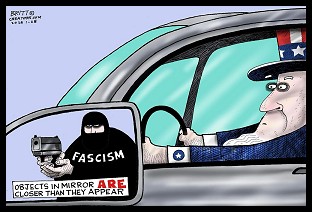 Sunday 'Mirror, Mirror' Toons
Sunday 'Mirror, Mirror' Toons 'Green News Report' 1/29/26
'Green News Report' 1/29/26 It's About Elections and the Windmills of His Mind: 'BradCast' 1/29/26
It's About Elections and the Windmills of His Mind: 'BradCast' 1/29/26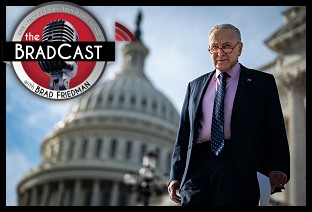 Govt Shutdown Over ICE Funding Near Certain This Weekend: 'BradCast' 1/28/26
Govt Shutdown Over ICE Funding Near Certain This Weekend: 'BradCast' 1/28/26 Trump Blinks, Bovino Out, MN Op Falters, Persists as Midterms Loom: 'BradCast' 1/27
Trump Blinks, Bovino Out, MN Op Falters, Persists as Midterms Loom: 'BradCast' 1/27  The ICE Murder of ICU Nurse Alex Pretti and the Heroes of Mpls: 'BradCast' 1/26/26
The ICE Murder of ICU Nurse Alex Pretti and the Heroes of Mpls: 'BradCast' 1/26/26  The BRAD BLOG: 22 Years and Still Counting
The BRAD BLOG: 22 Years and Still Counting Mr. Smith Testifies (Publicly) in Washington: 'BradCast' 1/22/26
Mr. Smith Testifies (Publicly) in Washington: 'BradCast' 1/22/26 World Turning Against Self-Destructing U.S. Under Trump: 'BradCast' 1/21/26
World Turning Against Self-Destructing U.S. Under Trump: 'BradCast' 1/21/26 Trump Waste, Fraud, Abuse on Voting, at DOJ, by DOGE: 'BradCast' 1/20/26
Trump Waste, Fraud, Abuse on Voting, at DOJ, by DOGE: 'BradCast' 1/20/26
 VA GOP VOTER REG FRAUDSTER OFF HOOK
VA GOP VOTER REG FRAUDSTER OFF HOOK Criminal GOP Voter Registration Fraud Probe Expanding in VA
Criminal GOP Voter Registration Fraud Probe Expanding in VA DOJ PROBE SOUGHT AFTER VA ARREST
DOJ PROBE SOUGHT AFTER VA ARREST Arrest in VA: GOP Voter Reg Scandal Widens
Arrest in VA: GOP Voter Reg Scandal Widens ALL TOGETHER: ROVE, SPROUL, KOCHS, RNC
ALL TOGETHER: ROVE, SPROUL, KOCHS, RNC LATimes: RNC's 'Fired' Sproul Working for Repubs in 'as Many as 30 States'
LATimes: RNC's 'Fired' Sproul Working for Repubs in 'as Many as 30 States' 'Fired' Sproul Group 'Cloned', Still Working for Republicans in At Least 10 States
'Fired' Sproul Group 'Cloned', Still Working for Republicans in At Least 10 States FINALLY: FOX ON GOP REG FRAUD SCANDAL
FINALLY: FOX ON GOP REG FRAUD SCANDAL COLORADO FOLLOWS FLORIDA WITH GOP CRIMINAL INVESTIGATION
COLORADO FOLLOWS FLORIDA WITH GOP CRIMINAL INVESTIGATION CRIMINAL PROBE LAUNCHED INTO GOP VOTER REGISTRATION FRAUD SCANDAL IN FL
CRIMINAL PROBE LAUNCHED INTO GOP VOTER REGISTRATION FRAUD SCANDAL IN FL Brad Breaks PA Photo ID & GOP Registration Fraud Scandal News on Hartmann TV
Brad Breaks PA Photo ID & GOP Registration Fraud Scandal News on Hartmann TV  CAUGHT ON TAPE: COORDINATED NATIONWIDE GOP VOTER REG SCAM
CAUGHT ON TAPE: COORDINATED NATIONWIDE GOP VOTER REG SCAM CRIMINAL ELECTION FRAUD COMPLAINT FILED AGAINST GOP 'FRAUD' FIRM
CRIMINAL ELECTION FRAUD COMPLAINT FILED AGAINST GOP 'FRAUD' FIRM RICK SCOTT GETS ROLLED IN GOP REGISTRATION FRAUD SCANDAL
RICK SCOTT GETS ROLLED IN GOP REGISTRATION FRAUD SCANDAL VIDEO: Brad Breaks GOP Reg Fraud Scandal on Hartmann TV
VIDEO: Brad Breaks GOP Reg Fraud Scandal on Hartmann TV RNC FIRES NATIONAL VOTER REGISTRATION FIRM FOR FRAUD
RNC FIRES NATIONAL VOTER REGISTRATION FIRM FOR FRAUD EXCLUSIVE: Intvw w/ FL Official Who First Discovered GOP Reg Fraud
EXCLUSIVE: Intvw w/ FL Official Who First Discovered GOP Reg Fraud GOP REGISTRATION FRAUD FOUND IN FL
GOP REGISTRATION FRAUD FOUND IN FL

































